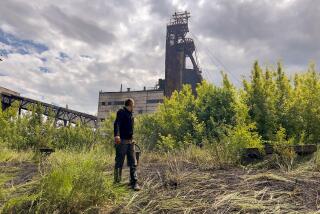Britain: Healing the Wounds
- Share via
The collapse of the coal miners’ strike in Great Britain is being heralded as a disaster for the miners’ union and a personal triumph for Prime Minister Margaret Thatcher. In this case, identifying winners and losers is an iffy business.
The strike began 51 weeks ago in response to a decision by the Conservative government to close 20 uneconomic mines and eliminate 20,000 mining jobs. Arthur Scargill, the fiery Marxist who runs the National Union of Mineworkers, was plainly determined to use strike-generated turmoil to force the Thatcher government from office, just as the union helped bring down Edward Heath’s government in 1974.
As things turned out, the best thing going for Thatcher, who never gave an inch in the confrontation, was the colossal misjudgment of Scargill himself. The strike came at a time when coal stockpiles were at record highs. In the face of high unemployment, members of other unions were loath to risk their own jobs in sympathy strikes. Most damaging, Scargill didn’t bother to poll his union membership before calling the strike.
Almost a fourth of the miners stayed on the job from the first. Picket-line violence, encouraged by Scargill, caused the injury of 1,500 workers and policemen and killed any prospect of public sympathy for the strike. It also put both the Labor Party and the Trades Union Congress at pains to distance themselves from Scargill. By the time the strike collapsed Sunday, the trickle of miners returning to work was becoming a flood.
The failure of the strike is bound to have a chastening effect on any future use of the strike weapon; that should be an important plus for the British economy, which has long suffered from excessively militant unionism.
Thatcher is likely to gain ground in the polls, but it far from clear that she is a net winner. Her rigid position during the strike deepened the impression that she is better at dividing the British people than at uniting them. Meanwhile, the invective hurled by left-wingers at opposition Labor Party leader Neil Kinnock for his lukewarm support of the strike probably has improved his acceptability to moderate voters.
The strike, which pitted brother against brother and friend against friend, created wounds that some commentators fear will require a generation to heal. The healing process will have more chance if the Tory government, which has vowed that there will be no general amnesty for strikers fired for breaking the law, makes some intelligent exceptions in individual cases.
More to Read
Sign up for Essential California
The most important California stories and recommendations in your inbox every morning.
You may occasionally receive promotional content from the Los Angeles Times.












